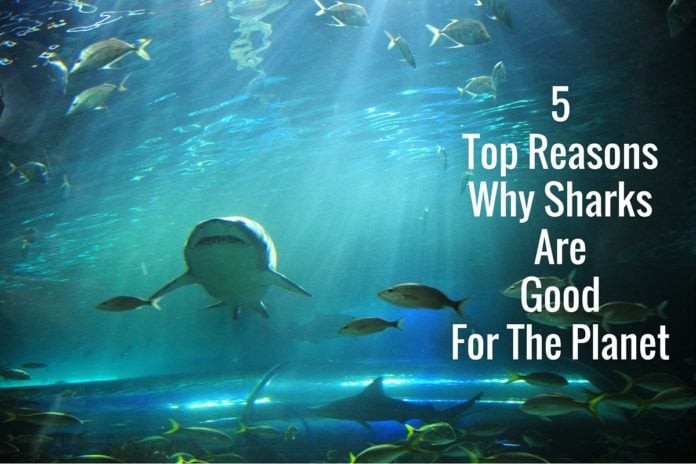Sharks are magnificent and majestic creatures that rule the oceans. They can either provide an experience of a lifetime for scuba divers or one that you would love to forget. As Jacques Cousteau once said “The only predictable thing about sharks is that they are unpredictable”.
At least one time in a divers life, they will be asked ‘you really go scuba diving? Aren’t you afraid of sharks?’ Spending time with sharks cannot only be good for your dive log; they also have a huge impact on our bodies as well as the world around us.
Here are 5 top reasons why sharks are good for the planet…
Sharks Can Do Wonders For Your Health
These large and sometimes intimidating fish have naturally occurring antibacterial and anticoagulant properties within the tissues in their bodies. Additionally, sharks have a liver enzyme known as ‘Squalamine,’ which has been studied for many years by scientists that have found it to be a natural antiviral. This research has been conducted in order to help find cures for chronic diseases such as hepatitis C and cystic fibrosis.
Sharks Have The Ability To Boost Tourism
Diving with sharks or even swimming with sharking is becoming more and more popular throughout the world. For those who want to experience the adrenaline rush of coming face to face with one of the most astounding creatures on the planet, all you have to do is find a place that suits you, book your ticket and go, it is as easy as that. As more and more people are becoming open to the idea of swimming with sharks, people are travelling to far off places in order to check it off their bucket list. Places such as South Africa, The Bahamas and the Galapagos Islands are all known for their shark inhabitants and are reaping the rewards from this newfound source of tourism, which in turn also provides a huge boost to the local economies.
According to a study published in 2013, Shark tourism generates over $300 million a year and is predicted to grow and grow over the next 20 years, providing thousands of job opportunities for locals. As well as benefiting locals and their economies, it is most likely that sharks take part in a number of roles within their natural habitats, which we have yet to understand or more importantly appreciate.
Sharks Are Essential To The Ocean’s Food Chain
There are a number of shark species that are known as ‘Apex Predators,’ which means that they sit at the highest part of the food chain. These sharks have an incredible way of separating sick and injured marine animals from the rest of the pack, keeping the overall marine population healthy and thriving.
Unfortunately, over the years the delicacy of ‘shark fin soup’ has become more and more popular, causing shark population numbers to decrease dramatically. Did you know that over 100 million sharks are killed every year? Naturally, their decline in numbers is causing a ripple effect, creating problems further down the food chain and even affecting us as humans.
A study showed that large sharks within the northwest Atlantic have decreased in number significantly since the middle of the 1980’s. The lack of sharks has lead to a huge population increase of certain species which would otherwise been eaten by sharks. Cownose Rays are one of these species. However, due to the sharp increase in the number of Cownose Rays, in turn the number of scallops has depleted drastically within the local bay regions. For over a century, North Carolina was known for its scallop fishing industry, however over the past few decades, this is no longer the case due to the lack of sharks keeping the food chain in check.
Sharks Change The Way We Think
Sharks are fascinating creatures and engineers have studied them over and over again because of their shape, agility and the way they move through the water as well as their streamlined bodies. It is quite common for scientists to imitate nature’s designs in order to solve issues that humans face. With a history of over 400 million years, sharks hold many answers to scientist’s questions and teach us a lot about speed and efficiency within the water.
Scientists have developed shark skin-like material, which has been used to create sleeker swimsuits, barnacle-proof ship hulls and even bacteria-resistant surfaces that have been used in hospitals and laboratories.
In addition, as the world continues to search for sustainable, clean energy alternatives to fossil fuels, a company based in Australia known as BioPower Systems has managed to design a device, which is similar to that of a sharks tail. This device has the ability to catch wave energy from the ocean and convert it into electric power, which sounds like it could be a promising solution.
Sharks Help Our Planet’s Atmosphere
Carbon is an essential element within the existence and the cycle of life. It also contributes to climate change. Deep-sea sharks as well as other scavenging species including hagfish and starfish, feed on the dead matter that collects on the sea floor and help to move carbon throughout the ocean.
Research has found that the larger a sea creature is, the more carbon it has within its body. Therefore, when large whales and sharks die, they naturally sink to the ocean floor, where scavengers eat them, allowing for the marine carbon cycle to continue. When sharks or whales are hunted by humans, they are immediately removed from the oceans carbon cycle which in turn disrupts the whole carbon process throughout the ocean and can result in a huge accumulation of carbon to be released into the atmosphere, which can lead to global warming and severe consequences for life on earth.
What Do YOU Think?
Let us know in the comments section below.

